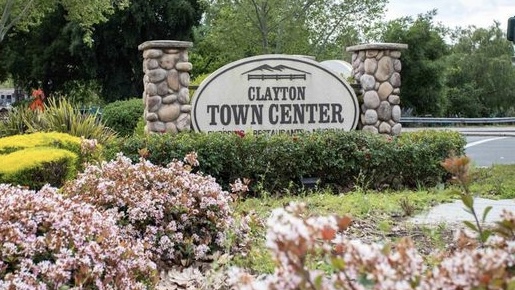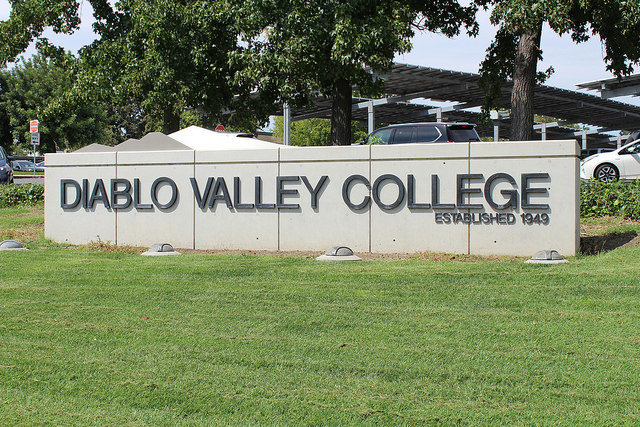DVC to implement new educational bill and change to assessment tests
DVC Latino Students Rally Behind Bernie Sanders (Samantha Laurey/The Inquirer).
February 11, 2019
Diablo Valley College students applying for transfer or an associate degree are facing new changes in requirements for credits for transfer or eligibility for an associate degree. A new placement process will be implemented for students who have yet to take ENG-122, ENG-122A or MATH-121 in this month due to DVC plans to implement Assembly Bill 705.
Math classes such as MATH-070, MATH-090, and MATH-122 will be removed and condensed to two courses: MATH-85 and MATH-119. Each class will incorporate different parts of the previous courses’ curriculum. Unlike the other classes, MATH-85 and MATH-199 will not be required but will be offered as a choice for students who do not feel ready for college-level courses.
Regarding courses offered by the English department, ENG-120 and ENG-122 will be combined into a 5 unit course according to English Department chair Alan Haslam.
“English is doing something similar,” wrote Haslam. “We like to say that developmental education is being restructured instead of eliminated.”
AB-705 entails that California community colleges must “maximize the probability that a student will enter and complete transfer-level coursework in English and math within a one year timeframe” as stated on the California Community Colleges website.
With this bill now being put into DVC’s policies, courses below ENG-122, ENG-122A, and MATH-121 are likely to be removed beginning Fall 2019. Additionally, some of these sections for these remaining classes have been cut down this semester, as stated in an email sent out to students regarding this change on Jan. 9 during the winter break.
The bill also states that districts and colleges are not to require students to enroll in remedial English or math courses, due to the fact that it extends the time a student has to complete transfer requirements and or the obtainment of an associate degree. The only instance in which this process is omitted is unless “unless placement research that includes consideration of high school grade point average and coursework shows that those students are highly unlikely to succeed in transfer-level coursework in English and mathematics.” as stated in the official AB-705 bill. The bill also adds that colleges must include additional support for students who do meet transfer level requirements. The district suggests that colleges have students take concurrent courses alongside a transfer level class to accommodate their own needs. For ESL students, additional language support must be supplied.
According to the 4CD website, studies have shown that community colleges are enrolling too many students into remedial classes and that placement tests tend to under-place students. With this requirement in place, the district believes that students would complete transfer requirements quicker if directly put into classes that align with their credits. Many, if not all remedial classes, do not necessarily result in a student obtaining credits as these classes are mainly used for preparation to college-leveled courses. Overall, 4CD believes that some assessment tests do more harm than good when it comes to placing students in remedial classes.
While the goal of adopting AB-705 is to assist students in the process of transferring or obtaining an associate’s degree quicker, students are still concerned about how the change will affect them.
4CD adds that colleges must include additional support for students who do meet transfer level requirements. The district suggests that colleges have students take concurrent courses alongside a transfer level class to accommodate their own needs. For ESL students, additional language support must be supplied.
Furthermore, AB-705 states that the California legislature found and discovered the following regarding community colleges.
“(1) The California community college system is the nation’s largest system of higher education and a critical entry point to higher education and opportunities for upward mobility.
(2) California’s community colleges identify more than 75 percent of its students as underprepared and refer this overwhelming majority of students to remedial courses.
(3) The choice of assessment instruments and placement policies has serious implications for equity since students of color are more likely to be placed into remedial courses.
(4) There are serious adverse consequences to a college incorrectly assigning a prepared student to remediation. These adverse consequences include discouraging some students from pursuing a postsecondary education, as well as burdening other students with higher educational costs and delaying their degree plans.
(5) Students placed into remediation are much less likely to reach their educational goals. According to the Student Success Scorecard, just 40 percent go on to complete a degree, certificate, or transfer outcome in six years, compared to 70 percent for students allowed to enroll directly in college-level courses.
(6) Numerous reputable studies suggest that community colleges are placing too many students into remediation and that many more students would complete transfer requirements in math and English if allowed to bypass remedial prerequisite courses and enroll directly in transfer-level English and math courses.
(7) Instruction in English as a second language (ESL) is distinct from remediation in English. Students enrolled in ESL credit coursework are foreign language learners who require additional language training in English, require support to successfully complete degree and transfer requirements in English, or require both of the above.
(8) The Board of Governors of the California Community Colleges has established rules to protect students from being excluded from courses in which they can be successful. This was in response to a Mexican American Legal Defense and Education Fund lawsuit that was settled in 1991 and was driven by concerns that assessment tests disproportionately placed Latino students into remedial prerequisite courses.
(9) Community colleges are prohibited from requiring students to take a prerequisite course unless they are highly unlikely to succeed in a higher-level course without it pursuant to Section 55003 of Title 5 of the California Code of Regulations, but this policy is not followed in practice. In math, broad exceptions allow community colleges to block students from courses in which they can be successful in the service of four-year university transfer policies.
(10) Colleges are also required to use multiple measures in determining course placement pursuant to Section 55522 of Title 5 of the California Code of Regulations, but Title 5 of the California Code of Regulations does not provide enough guidance in the use of multiple measures to ensure that students are not excluded from courses in which they can be successful.
(11) A 2016 report by the Public Policy Institute of California found that California community colleges still use placement tests extensively, and that the use of other student achievement measures for placement was sparse and unsystematic.
(12) There is evidence that when used as the primary criterion for placement, these tests tend to underplace students—leading colleges to assign students to remedial courses when those students could have succeeded in college-level courses. The reliance of test scores as the determinant factor for high-stakes placement decisions runs contrary to testing industry norms.
(13) Research shows that a student’s high school performance is a much stronger predictor of success in transfer-level courses than standardized placement tests.
(14) The community college system is in a good position to improve placement practices. The system’s Multiple Measures Assessment Project and Common Assessment Initiative have conducted deep and research-driven work on the use of high school performance to greatly improve the accuracy of the placement process.
(15) The Legislature has made significant investments to improve student assessment and placement. These investments most recently include the Community College Basic Skills and Student Outcomes Transformation Program grants, which are providing selected colleges with funding to redesign remedial assessment and placement, as well as curriculum and career pathways.
(16) The goal of this act is to ensure that students are not placed into remedial courses that may delay or deter their educational progress unless evidence suggests they are highly unlikely to succeed in the college-level course.
(b) It is the intent of the Legislature that the State Department of Education and the Chancellor’s Office of the California Community Colleges work collaboratively to ensure timely access to data regarding high school performance for purposes of community college student placement.”
DVC states that they will be adding more information this month about the specific incorporation of AB-705 into assessment testing. They encourage students to visit the Right Place to Start webpage for updates.









































































